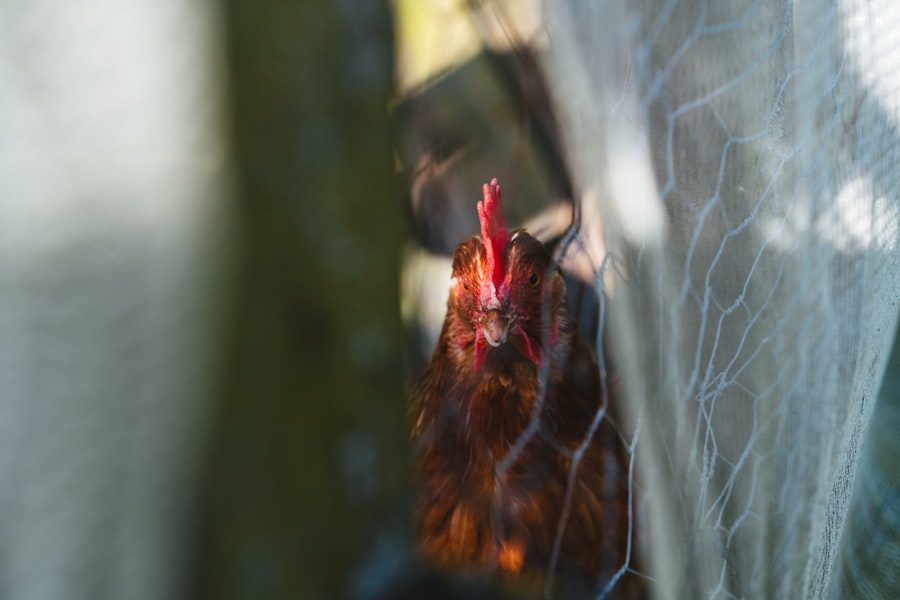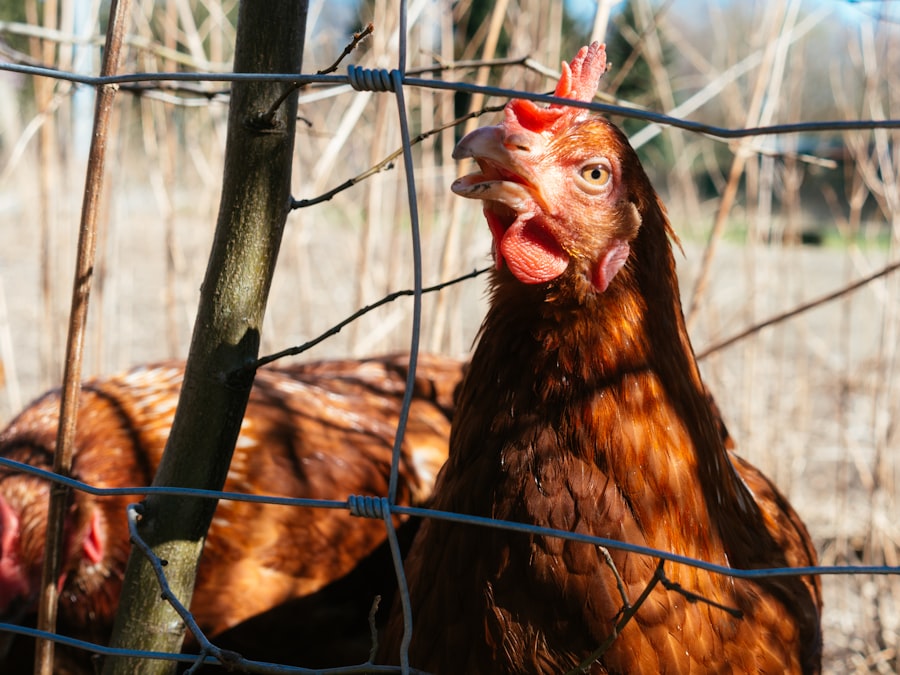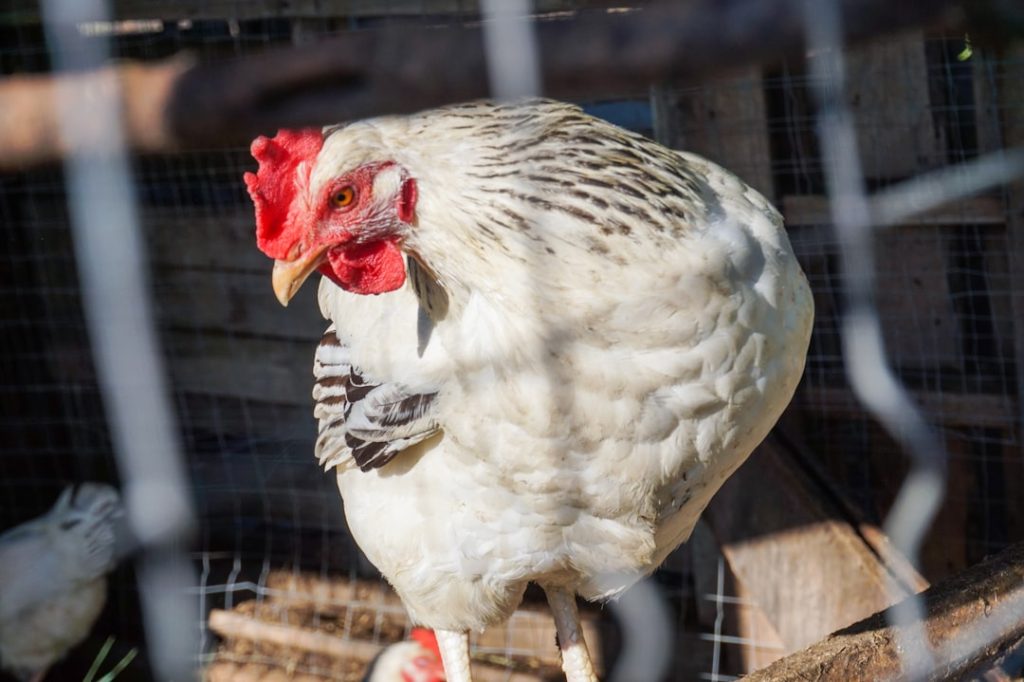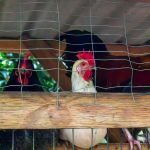Chickens are social creatures that naturally thrive in flocks. They possess innate behaviors such as foraging, dust bathing, and roosting in elevated positions. These instincts are crucial to consider when preventing escapes.
Chickens exhibit curiosity but can be easily startled by sudden movements or loud noises. They are capable jumpers and can clear low barriers when motivated. Routine is important to chickens, and disruptions can cause stress.
Chickens display territorial behavior and may become aggressive towards perceived threats, including other animals or humans. This territoriality can potentially lead to escape attempts as chickens seek to establish dominance in new areas. Understanding the social hierarchy within a flock is essential for managing aggressive behaviors that might result in escape attempts.
By comprehending these natural chicken behaviors, caretakers can more effectively anticipate and prevent potential escapes.
Table of Contents
- 1 Choosing the right fencing materials
- 2 Installing barriers to prevent jumping
- 3 Providing adequate space and enrichment
- 4 Training and socializing your chickens
- 5 Monitoring and addressing any escape attempts
- 6 Seeking professional help if necessary
- 7 FAQs
- 7.1 What are some effective ways to keep chickens from jumping over a fence?
- 7.2 How can I clip my chickens’ wings to prevent them from jumping over the fence?
- 7.3 What type of barrier can I add to the top of the fence to prevent chickens from jumping over?
- 7.4 How can I provide enough space and entertainment within the enclosure to discourage chickens from jumping over the fence?
Key Takeaways
- Chickens are social animals and exhibit various behaviors such as scratching, dust bathing, and roosting.
- When choosing fencing materials, consider the size and strength of the chickens, as well as the predators in the area.
- Install barriers such as netting or overhead covers to prevent chickens from jumping over fences.
- Provide adequate space for chickens to roam and include enrichment activities such as perches and dust baths.
- Socialize and train chickens to reduce the likelihood of escape attempts and address any issues promptly.
- Regularly monitor the fencing and address any weak spots or signs of wear to prevent escape.
- Seek professional help if you are unable to effectively contain your chickens or if there are persistent escape attempts.
Choosing the right fencing materials
Fence Height and Spacing
Chickens are skilled jumpers and can easily clear low fences, so it’s essential to choose a fence that stands at least 6 feet tall to prevent escape attempts. Additionally, the spacing between fence posts should be no more than 2 inches to prevent chickens from squeezing through.
Durability of Fencing Materials
Chickens are persistent and can easily damage flimsy fencing materials. Therefore, it’s crucial to select materials that are strong and resistant to wear and tear. Welded wire fencing or chain link fencing are popular choices for chicken enclosures as they are sturdy and can withstand the pecking and scratching of the chickens.
Visibility and Stress Reduction
Chickens are easily startled by sudden movements or loud noises, so choosing fencing materials that provide some visibility can help reduce their stress levels and prevent escape attempts. By selecting the right fencing materials, you can create a secure enclosure that will keep your chickens safe and happy.
Installing barriers to prevent jumping

In addition to choosing the right fencing materials, it’s important to install barriers to prevent chickens from jumping over the fence. One effective way to do this is by installing a wire mesh roof over the enclosure. This will prevent the chickens from flying over the fence and escaping.
The wire mesh should be securely attached to the top of the fence posts and should extend at least 2 feet beyond the perimeter of the enclosure to prevent any escape attempts. Another option is to install a slanted roof over the enclosure. This will make it more difficult for the chickens to gain enough height to clear the fence.
The slanted roof should be made of sturdy materials such as corrugated metal or heavy-duty wire mesh to prevent the chickens from damaging it. Additionally, you can also consider installing a barrier around the base of the fence to prevent the chickens from digging underneath it. This can be done by burying wire mesh or hardware cloth around the perimeter of the enclosure.
By installing barriers to prevent jumping, you can further secure your chicken enclosure and prevent any potential escape attempts.
Providing adequate space and enrichment
One of the main reasons why chickens may attempt to escape is due to a lack of adequate space and enrichment within their enclosure. Chickens are naturally active animals that require space to move around, forage for food, and engage in natural behaviors such as dust bathing and roosting. Providing them with ample space and enrichment can help reduce their desire to escape.
It’s important to provide at least 10 square feet of space per chicken in their enclosure. This will allow them to move around freely and engage in natural behaviors without feeling cramped or stressed. Additionally, providing them with plenty of enrichment such as perches, dust bathing areas, and hanging treats can help keep them mentally stimulated and prevent boredom, which can lead to escape attempts.
Another important aspect of providing adequate space and enrichment is ensuring that the enclosure is kept clean and well-maintained. Regularly cleaning out their bedding, providing fresh water and food, and regularly rotating their enrichment items can help keep them happy and content within their enclosure. By providing adequate space and enrichment, you can reduce the likelihood of your chickens attempting to escape.
Training and socializing your chickens can also play a key role in preventing escape attempts. By spending time with your chickens and handling them regularly, you can help build trust and establish a bond with them. This can help reduce their stress levels and make them less likely to attempt to escape.
Additionally, training your chickens to come when called can be a useful tool in preventing escape attempts. By using positive reinforcement such as treats or mealworms, you can train your chickens to respond to a specific call or sound, making it easier to round them up if they do manage to escape. Socializing your chickens with other animals can also help reduce their desire to escape.
Introducing them to other pets such as dogs or cats in a controlled environment can help them become familiar with other animals and reduce any fear or anxiety they may have towards them. By training and socializing your chickens, you can build a strong bond with them and reduce the likelihood of escape attempts.
Monitoring and addressing any escape attempts

Preventing Chicken Escapes
Chickens can be clever and determined when it comes to escaping, so it’s essential to stay one step ahead. Monitoring their behavior closely and addressing any escape attempts promptly is crucial.
Identifying the Causes of Escape Attempts
If you notice any signs of restlessness or agitation within the flock, it’s important to investigate the cause and make any necessary adjustments to their enclosure. This may involve identifying and addressing potential stressors, such as overcrowding, lack of resources, or predator threats.
Responding to Escape Attempts
If an escape does occur, it’s essential to act quickly to prevent it from happening again. This may involve reinforcing any weak spots in the fence, adding additional barriers, or making changes to their environment to reduce their desire to escape. It’s also important to check for any potential predators or other threats that may be causing them distress and address these issues accordingly.
Maintaining a Secure Enclosure
Regularly inspecting the enclosure for any signs of wear and tear that may compromise its security is vital. This may include checking for loose fencing materials, damaged barriers, or areas where the chickens may be attempting to dig underneath the fence. By monitoring and addressing any escape attempts promptly, you can prevent future incidents and keep your chickens safe and secure.
Seeking professional help if necessary
If despite your best efforts, you find that your chickens continue to attempt to escape, it may be necessary to seek professional help. A professional animal behaviorist or poultry expert can provide valuable insight into the reasons behind their behavior and offer practical solutions for preventing escape attempts. Additionally, seeking advice from experienced chicken keepers or joining online forums and communities dedicated to poultry keeping can provide valuable support and guidance in addressing any escape attempts.
These resources can offer practical tips and advice based on real-life experiences that can help you better understand and address your chickens’ behavior. In some cases, it may also be necessary to consult with a professional contractor or fencing specialist to make any necessary modifications or improvements to their enclosure. This may involve installing additional barriers, reinforcing weak spots in the fence, or making changes to their environment to reduce their desire to escape.
By seeking professional help if necessary, you can gain valuable insights and support in addressing any escape attempts and ensure the safety and well-being of your chickens. In conclusion, understanding the behavior of chickens is crucial in preventing them from escaping. By choosing the right fencing materials, installing barriers to prevent jumping, providing adequate space and enrichment, training and socializing your chickens, monitoring and addressing any escape attempts, and seeking professional help if necessary, you can create a secure environment for your chickens that will keep them safe and content.
With careful planning and attention to their needs, you can ensure that your chickens remain happy and healthy within their enclosure.
If you’re looking for more tips on keeping chickens, you might be interested in an article on turning a shed into a chicken coop. This article provides valuable information on how to repurpose a shed to create a comfortable and secure living space for your chickens. Check it out here.
FAQs
What are some effective ways to keep chickens from jumping over a fence?
Some effective ways to keep chickens from jumping over a fence include clipping their wings, adding a barrier to the top of the fence, and providing enough space and entertainment within the enclosure to discourage jumping.
How can I clip my chickens’ wings to prevent them from jumping over the fence?
To clip a chicken’s wings, you can gently restrain the bird and trim the primary feathers on one wing. This will make it difficult for the chicken to achieve lift and jump over the fence.
What type of barrier can I add to the top of the fence to prevent chickens from jumping over?
Adding a barrier such as chicken wire or netting to the top of the fence can prevent chickens from gaining enough height to jump over. Make sure the barrier is securely attached to the top of the fence to prevent any gaps.
How can I provide enough space and entertainment within the enclosure to discourage chickens from jumping over the fence?
Providing a spacious and enriching environment within the enclosure, such as perches, dust baths, and toys, can keep chickens occupied and less likely to attempt to escape by jumping over the fence. Regularly rotating and adding new enrichment items can also help keep chickens engaged.

Meet Walter, the feathered-friend fanatic of Florida! Nestled in the sunshine state, Walter struts through life with his feathered companions, clucking his way to happiness. With a coop that’s fancier than a five-star hotel, he’s the Don Juan of the chicken world. When he’s not teaching his hens to do the cha-cha, you’ll find him in a heated debate with his prized rooster, Sir Clucks-a-Lot. Walter’s poultry passion is no yolk; he’s the sunny-side-up guy you never knew you needed in your flock of friends!
Meet Walter, the feathered-friend fanatic of Florida! Nestled in the sunshine state, Walter struts through life with his feathered companions, clucking his way to happiness. With a coop that’s fancier than a five-star hotel, he’s the Don Juan of the chicken world. When he’s not teaching his hens to do the cha-cha, you’ll find him in a heated debate with his prized rooster, Sir Clucks-a-Lot. Walter’s poultry passion is no yolk; he’s the sunny-side-up guy you never knew you needed in your flock of friends!







